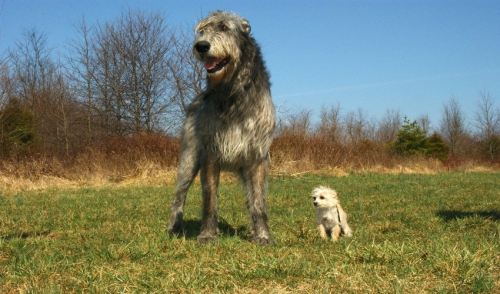
Why Don’t Big Dogs Live as Long as Small Dogs?
The understanding that big dogs don’t live as long as small dogs is a well-known phenomenon among dog lovers everywhere including myself. I love big dogs like Great Danes and Dobermans and without fail someone always mentions how they live shorter lives than their smaller counterparts. The truth is that even though this phenomenon is well known, it’s not well understood as much as we would like it to be.
What we do know is that smaller breeds have an average life expectancy of 12 -15 years. For larger breeds the life expectancy is normally 7-10 years. As for the small division of giant breeds, the typical lifespan is 5-8 years. For any dog lover, these numbers are scary, but it shouldn’t deter you away from getting a large dog. In fact, I have found from experience that many large breeds defy the odds and live longer than average. I’ve also noticed, there’s a strong affinity for large breeds out there. Large dogs are smart, loyal, and protective so of course any owner would find such an animal a suitable pet and companion.
What’s interesting is that overall, larger animals typically always live longer than smaller ones. A cat would live longer than a mouse the same way a blue whale would live longer than small fish. So why don’t big dogs live as long as small dogs? Scientists believe that the reason why large breeds live shorter lives is due to the way large dogs use energy. According to recent studies, big dogs don’t live as long as small dogs because of the way they are bred and the way that they grow. In comparison to small dogs, larger dogs tend to grow very big very fast. There’s a lot of truth to this as any dog owner can tell you, large dogs can spring up like weeds. One day your feeding them puppy chow, and all of sudden you blink and there’s this 100 pound animal waking you up to eat again. This type of scenario happens with many large breeds. For example, from birth to its first birthday, a Great Dane can grow 100-fold in weight. To give you a better idea, in that same amount of time, a wolf would increase 60-fold, a small poodle would only increase 20-fold, and we as humans would only grow a mere threefold. Scientists believe large dogs die young due to this accelerated growth in addition to an increase in free radical activity. If you’re not familiar the concept of free radical activity is derived from the free radical theory of aging (FRTA) which states that living organism age because cells accumulate free radical damage over time. Since most biological free radicals are highly reactive, they can cause oxidative damage which is what happens to large dogs as they grow. This means that while your dog is living and thriving as a puppy, the free radical damage associated with its hyper growth can cause potential harm to the health of your pet long term. Many scientists also believe that because of this dogs are more prone to health issues and developmental disorders; all of which can shorten the life of your dog.
For now, this is the best explanation as to why big dogs do not live as long as small dogs. Regardless of the statistics or common knowledge, don’t let the life span of an animal keep you from it. Always, ask questions about how the dog was bred to learn more about potential risks and consult with your local veterinarian if you have further concerns. There will be future research on this subject and there are always exceptions. Regardless of its size, breed, or how long it lives, your dog will always be your best friend.
